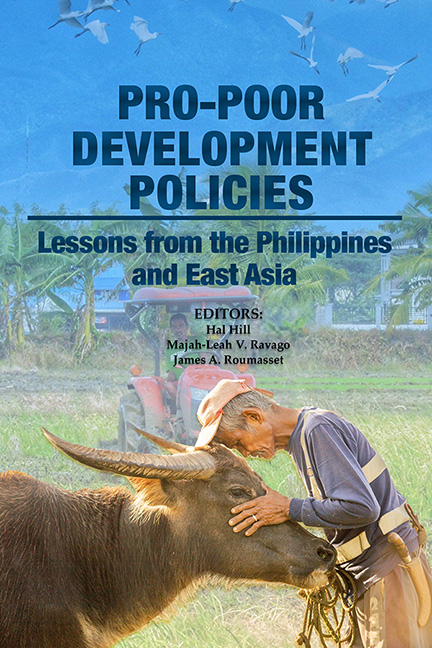Book contents
- Frontmatter
- Dedication
- Contents
- Figures, Tables and Boxes
- Foreword
- Foreword
- Message
- Preface and Acknowledgements
- About the Editors
- About the Contributors
- Acronyms
- Part 1 Introduction and Synthesis
- Part 2 Agricultural and Economic Development
- Part 3 Economic Policies for Achieving Targeted Levels of Living in the Philippines
- Part 4 Inequality and Economic Development
- Part 5 Competition Law and Policy
- Part 6 International Dimensions
- Index
Foreword
Published online by Cambridge University Press: 09 January 2024
- Frontmatter
- Dedication
- Contents
- Figures, Tables and Boxes
- Foreword
- Foreword
- Message
- Preface and Acknowledgements
- About the Editors
- About the Contributors
- Acronyms
- Part 1 Introduction and Synthesis
- Part 2 Agricultural and Economic Development
- Part 3 Economic Policies for Achieving Targeted Levels of Living in the Philippines
- Part 4 Inequality and Economic Development
- Part 5 Competition Law and Policy
- Part 6 International Dimensions
- Index
Summary
I am very pleased to be drawn into this gentle conspiracy to surprise the honoree, Dr. Arsenio Balisacan, with a Festschrift on the occasion of his sixty-fifth birth anniversary.
Arsi, as he is known to friends, is an economist, teacher, research scholar, anti-poverty activist and public servant, all rolled into one. In his journey of achievement, he has experienced a difficult tale of passage from poor rural surroundings in the Ilocos region of northern Luzon, through disciplined work in the pursuit of his chosen professional dream. Today, he is one of the nation’s foremost economists, respected by peers and admired by younger ones in the academe and in government, some of whom he had mentored. Importantly too, he holds a high position of influence that can improve the country’s economic future.
I met Arsi in Washington, DC, in 1986, as he was about to head for home. He had just completed his participation as a young research intern in the World Bank’s study of agriculture and economic development. I suggested to him then that he join the School of Economics at the University of the Philippines in Diliman. I sent an encouraging word about him to Dean Jose Encarnacion.
At that time, Arsi reminded me that we had actually first met in the early 1970s in Baguio, the country’s summer capital, when he was a much younger man. He was then a delegate to a national conference of young public high school leaders that I happened to address as inspirational speaker. He was a young student from a poor family possessed by high educational aspirations. In that situation, success depended mainly on the thin and uncertain thread of scarce financial scholarships to support his study. He succeeded in turning small attainments into opportunities. Eventually, he made them into golden steps. Through scholarships he moved from a rural Ilocos state-supported university to the graduate programme in agricultural economics of the University of the Philippines Los Baños and then a PhD in economics with a teaching assistantship at the University of Hawaii and later a doctoral internship at the East-West Center.
- Type
- Chapter
- Information
- Pro-poor Development PoliciesLessons from the Philippines and East Asia, pp. xxvi - xxviiiPublisher: ISEAS–Yusof Ishak InstitutePrint publication year: 2022



